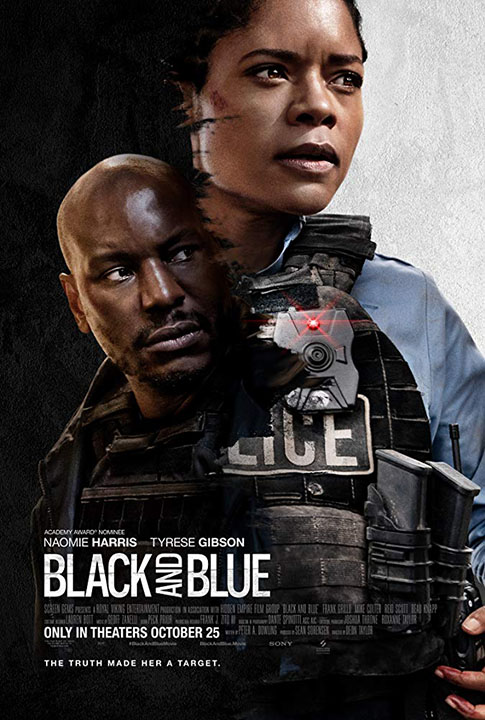![]() A little over an hour into “The Informer”, Pete Koslow (an excellent Joel Kinnaman) makes a call from jail. He’s trying to get on to his FBI handler to sort out the parameters of his role as an informant. But as the call goes on, he realises that he’s in over his head. The realisation hits like a ton of bricks and as the camera stays, mercilessly, on Kinnaman’s face we watch him trying to make sense of the dizzying turn of events. It’s the turning point in a film that has already had its share of turning points, with more to come, and one of the sharpest moments in the well-paced thriller. There’s a similar moment in the police-drama, “Black and Blue”. In this case, policewoman Alicia West (played by Naomie Harris in fine form) is confiding her recently learned knowledge to someone she trusts. She’s uncovered a ring of corrupt cops in her department and is trying to turn them in, but as she sorts out her feelings, she realises that her confidante is equally compromised, and like in “The Informer” the camera stays on her face as the horrible truth dawns. The fact that both thrillers feature their protagonists coming-to-grips with betrayal is not incidental, but speaks to a larger relationship between the two films.
A little over an hour into “The Informer”, Pete Koslow (an excellent Joel Kinnaman) makes a call from jail. He’s trying to get on to his FBI handler to sort out the parameters of his role as an informant. But as the call goes on, he realises that he’s in over his head. The realisation hits like a ton of bricks and as the camera stays, mercilessly, on Kinnaman’s face we watch him trying to make sense of the dizzying turn of events. It’s the turning point in a film that has already had its share of turning points, with more to come, and one of the sharpest moments in the well-paced thriller. There’s a similar moment in the police-drama, “Black and Blue”. In this case, policewoman Alicia West (played by Naomie Harris in fine form) is confiding her recently learned knowledge to someone she trusts. She’s uncovered a ring of corrupt cops in her department and is trying to turn them in, but as she sorts out her feelings, she realises that her confidante is equally compromised, and like in “The Informer” the camera stays on her face as the horrible truth dawns. The fact that both thrillers feature their protagonists coming-to-grips with betrayal is not incidental, but speaks to a larger relationship between the two films.
“The Informer” and “Black and Blue” are two genre films working with specific closeness in the crime thriller genres, buoyed by marvellous performances at their centre. They’re both mining familiar territory with real world implications – institutions of power cannot be trusted, especially law-enforcement bodies. Familiar themes notwithstanding, both films are doing more than treading already trodden ground. In both cases, there’s enough technical proficiency and narrative commitment at work to establish the value of the commentary at work in both films.
In “The Informer”, reformed criminal and FBI informant Pete Koslow gets caught up in NYPD / FBI crosshairs when an NYPD officer dies in his presence turning him into a pawn for the both organisations, and the Polish crime syndicate he’s been infiltrating. The film is adapted from a 2009 Swedish novel, and the labyrinth heavy twist and turns of the plot do recall the intricacies of a well-plotted novel in the best of ways. On its surface, “The Informer” is familiar but the plot heavy film (it’s no surprise a criticism has been that it may work better as a miniseries) establishes its value in the way that it unpredictably resists classification with an unpredictable plot turn at every corner. Every fifteen minutes the film seems to be gestating into something different and the thing keeping these conflicting streams together is the man at the centre of it –Kinnaman as Koslow.
The film is not quite a character study, and “The Informer” features a strong ensemble cast doing good work. The screenplay by trio of Andrea Di Stefano (who also directs), Matt Cook and Rowan Joffe isn’t ostensibly working to dig into Koslow’s character in any incisive way, and yet every scene with Kinnaman feels like it’s digging deep. Kinnaman is most recognisable as the lead of the ill-fated “RoboCop” remake, but has done his best work on the small-screen, such as in AMC’s “The Killing”. Here, he’s afforded the chance to play on his abilities in a performance that, in a fair world, would propel him to stardom.
There’s an inherent ambivalence in him that is registered in paradoxes – handsome like a traditional movie star, but retains a nervous energy that makes him seem immediately shifty or compromised. He carries his height like a weapon, rather than with ease. And, he distils that same ambiguity to such good effect here, shouldering the film and making Koslow opaque enough to retain mystery, but sympathetic in spite of his moral greyness.
It’s the same kind of shouldering that Naomie Harris is doing in “Black and Blue”. Like Kinnaman she’s assisted by an able cast, but her corrupt-cop drama is dependent on her ability to shoulder a great level of emotional rectitude. “Black and Blue” is less assured in its development, and less sharp about its thrills, but it’s also working towards something different with a specific focus on contemporary cultural conversation about race and police corruption in America. Harris’ Alicia is a returning veteran who newly joins the police force in her hometown, but the residents are appropriately mistrustful of the police who ignore or exploit the community, and the police’s inherent racism means Alicia is similarly at odds with that community, so she’s isolated in the middle. This initial isolation deepens when she witnesses some of her colleagues murdering some community members, and the film begins in earnest as Alicia must race against time to get her bodycam footage uploaded to the police server while avoiding what seems like the entire police force – the majority of whom seem compromised – and the members of the community who believe she is the perpetrator.
Whereas “The Informer” benefits from an ambivalent unpredictably all the way to its ambiguous ending, “Black and Blue” is more discernibly interested in telegraphing its intentions. Alicia’s only ally is a childhood friend (an outstanding Tyrese Gibson) as she struggles to make sense of the corruption and do the right thing, if only because her altruistic persona demands it. Director Deon Taylor knows how to shoot a chase scene and the film’s cat-and-mouse race between Alicia and her assailants are the best sequences, where Harris earns our empathy while playing both action hero and emotional centre. The performance deepens the context of the film, turning it into something immediately more vibrant than you would expect.
What’s great about both films is the way that they utilise the pop culture friendly crime genre to illuminate, rather than obscure, things about the world we live in. “Black and Blue” comes out more hopeful than “The Informer” but they’re interrogating questions like what it means to be a hero, who should be accountable and the difficulty of trying to resist evil when it’s baked into the fabric of our very existence. Within this dynamic, “The Informer” and its ambivalence seems more apt for 2019 but both films are worthy entries for the year, offering complementary accounts of the state of corruption that reflect our own world.
“Black and Blue” is currently playing at Caribbean Cinemas and MovieTowne Guyana.










